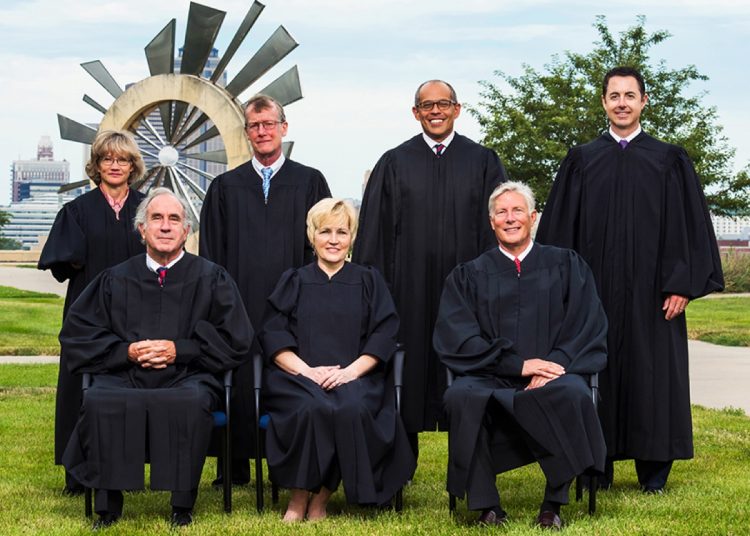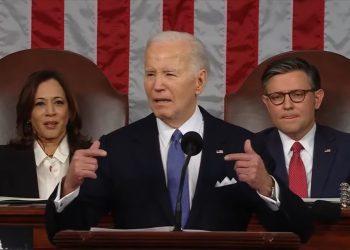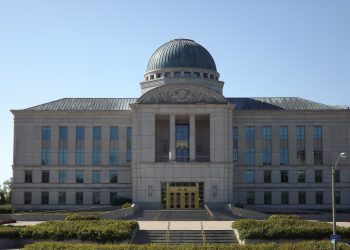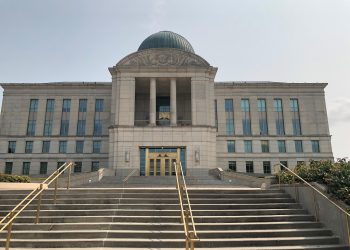The Iowa Supreme Court on Wednesday reversed former Workers’ Compensation Commissioner Christopher Godfrey’s 2019 lawsuit victory over former Governor Terry Branstad. It remanded the case back to District Court.
An eight-member jury in 2019 decided that former Governor Terry Branstad discriminated against Godfrey based on his sexual orientation. They awarded Godfrey $1.5 million in damages.
Branstad slashed Godfrey’s salary by 35 percent to the lowest level allowed by state law after Godfrey refused to resign after the governor requested it. Godfrey was confirmed to a six-year term as Commissioner by the Iowa Senate. He claims that Branstad’s asking for his resignation and then cutting his salary was due to his sexual orientation. Branstad said he wanted a pro-business commissioner and had received complaints from members of the business community about Godfrey, who was appointed by former Democratic Governor Tom Vilsack and then reappointed by former Democratic Governor Chet Culver.
After winning the 2010 gubernatorial election to go back to Terrace Hill after 12 years in the private sector, Branstad sent a letter to 30 appointees requesting their resignation and did not single out Godfrey.
The Iowa Supreme Court’s 7 to 0 ruling reversing this was just.
In a nutshell, the opinion could be boiled down in this phrase: “There was no evidence.”
Here is a recap of “evidence” that District Court Judge Brad McCall allowed the plaintiffs to present offered by Caffeinated Thoughts:
- Branstad’s public policy positions on gay marriage, the Varnum v. Brien Supreme Court decision that allowed same-sex marriage in Iowa, and the constitutional amendment process
- Evidence of Branstad’s and staff’s affiliation with the Republican Party of Iowa deemed “anti-gay.”
- The private religious beliefs of staff members who worked for the Iowa Association of Business and Industry who advised Branstad on Godfrey
- Opinion testimony from Democratic lawmakers, who had nothing to do with Branstad’s decision, about the “anti-gay” Republican Party of Iowa
To sum up, a jury decided, and the judge allowed, that if you are a Republican or a Christian who believes same-sex marriage is wrong, you must be guilty of discrimination if you fire a gay employee. All they had was circumstantial evidence.
Justice Christopher McDonald, writing the opinion for the court, said:
“There is no evidence Governor Branstad, the sole decision-maker in this case, had actual knowledge of Godfrey’s sexual orientation at any time prior to seeking Godfrey’s resignation or reducing his salary within the statutory range. Governor Branstad left office in 1999, entered the private sector, and stayed out of politics. More than six years after Governor Branstad left office, Governor Vilsack appointed Godfrey interim commissioner. In 2007 and 2009, Governor Culver appointed Godfrey commissioner. There is no evidence Governor Branstad was at the capitol around the time of the confirmation hearings. There is no evidence Branstad spoke with any legislators around the time of the confirmation hearings. There is no evidence any legislator communicated to Branstad any information about Godfrey. There is no evidence Governor Branstad knew of or followed Godfrey’s confirmation. Governor Branstad denied any knowledge of Godfrey’s sexual orientation until Godfrey’s public statements after Branstad had already implemented the salary reduction. There was no testimony from any witness that any person—whether an elected official, member of Branstad’s staff, representative from ABI, or any other person—told Governor Branstad Godfrey was gay, heard Governor Branstad make a comment regarding Godfrey’s sexual orientation, or heard Governor Branstad even inquire about Godfrey’s sexual orientation any time prior to the salary reduction.”
There is evidence of Branstad hiring openly gay staff as president of Des Moines University, Governor, and U.S. Ambassador to China. So to the point, you can’t prove sexual orientation discrimination if you can’t prove the sole-decision maker, Branstad, even knew about Godfrey’s sexual orientation.
McDonald also challenged the circumstantial evidence allowed by Judge McCall for the jury to consider:
“We reject as illogical and fallacious the district court’s conclusion that a jury could infer Governor Branstad knew Godfrey was gay because there was ‘[a]bundant evidence . . . presented to establish the Republican Party was ‘anti-gay’ in its policies and platform planks.’ The district court’s reasoning fails at several levels. First, it does not logically follow that the Republican Party’s political position on issues related to sexual orientation, such as same-sex marriage or adoption, means that the party is ‘anti-gay’ in the sense that it is opposed to the rights of gay persons to a workplace free from sexual-orientation discrimination. Indeed, the record in this case disproves the inference. Governor Vilsack voted in favor of DOMA, but he appointed Godfrey to the position of commissioner. Governor Culver stated that he ‘personally believe[d] that marriage is between a man and a woman,’ but he appointed Godfrey to the position of commissioner twice. Governor Branstad, in the election of 2010, expressed his view that the citizens of Iowa should be allowed to vote on a marriage amendment to the Iowa Constitution, but several months after the election he appointed an openly gay man to serve as Director of the State–Federal Relations Office. Even Godfrey testified that an individual’s party affiliation and views on ‘gay issues’ are not necessarily correlated.
“Second, even if we assume the evidence established the Republican Party was ‘anti-gay’ in the sense the party was opposed to the rights of gay persons to a workplace free from sexual-orientation discrimination, the evidence does not support a logical inference that Governor Branstad was anti-gay. […]
“Third, even if we assume this evidence would support an inference that Governor Branstad was anti-gay, that inference would only support a further inference that Governor Branstad was motivated by discriminatory animus if there was evidence he had actual knowledge of the plaintiff’s sexual orientation. There was no evidence Governor Branstad had actual knowledge of Godfrey’s sexual orientation prior to reducing Godfrey’s salary within the statutory range.
“Finally, Godfrey testified it was his personal belief that Governor Branstad knew he was gay and discriminated against him because he was gay, but there was no evidence to support Godfrey’s personal belief. Godfrey’s personal, conclusory beliefs are insufficient as a matter of law to generate a fact question for the jury.”
There was no evidence. Dismissing this case was a win for Iowa’s taxpayers.
Read the entire decision below:
191954_2D907CB7ACBB0















